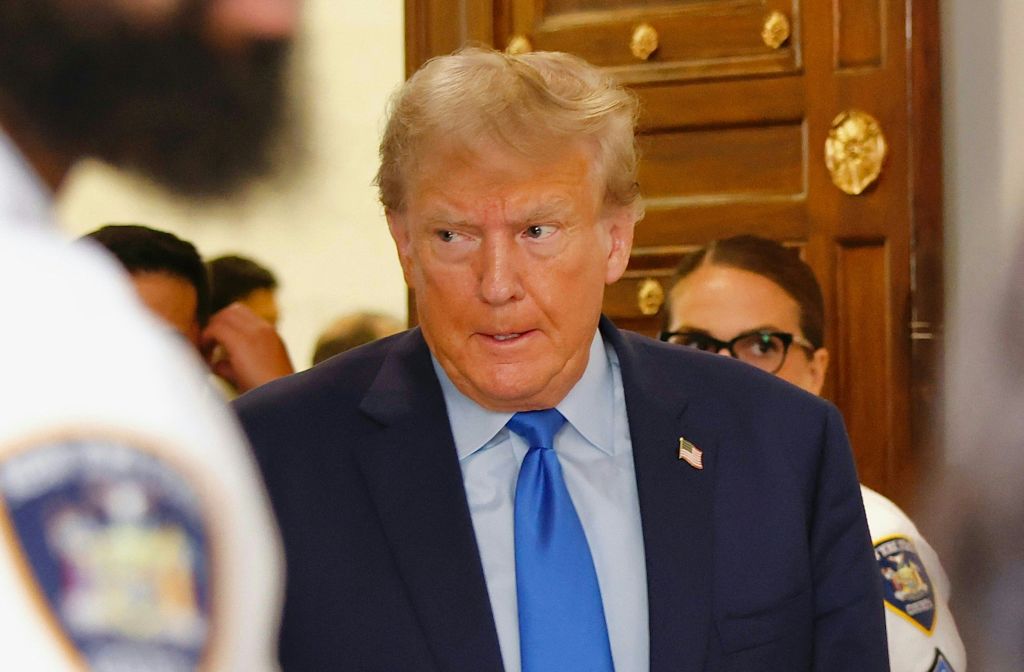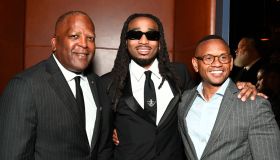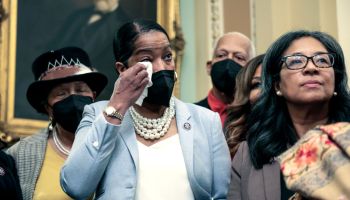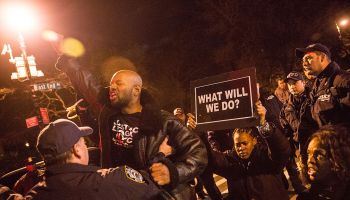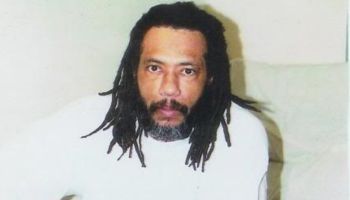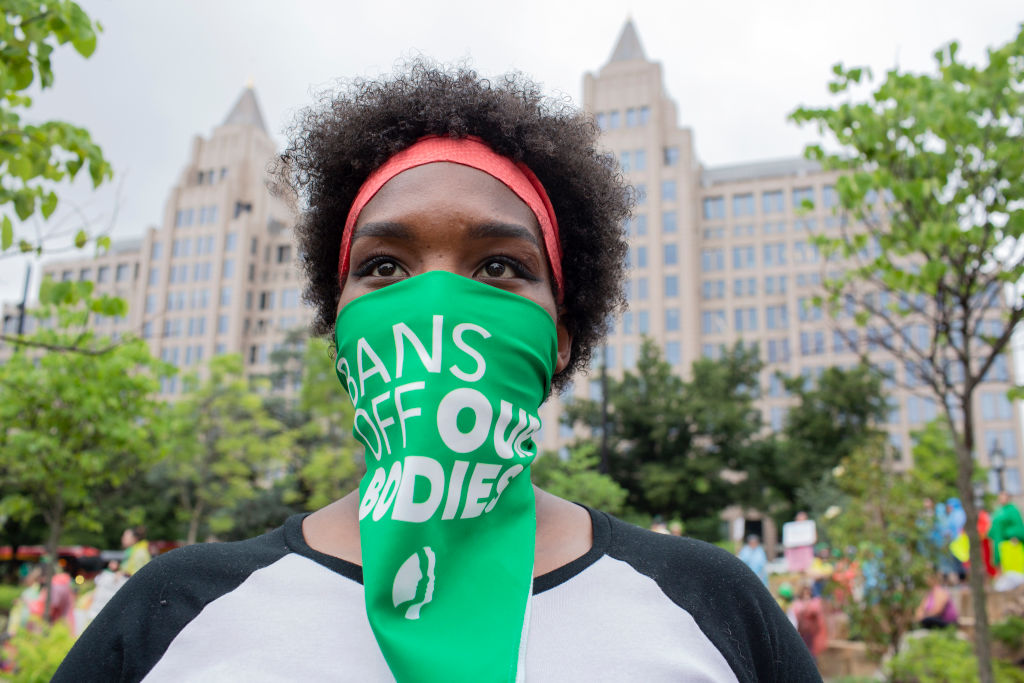
Abortion advocates protest against the swift deprivation of rights and bodily autonomy Source: Probal Rashid / Getty
There’s more outrage over a simple line in a speech Vice President Kamala Harris gave at the NAACP convention Monday than the ongoing deprivation of fundamental rights impacting communities around the country. Before she closed out her remarks, she spoke about the commitment to protecting fundamental freedoms, including bodily autonomy and access to abortion.
“We know, NAACP, that our country has a history of claiming ownership over human bodies,” Harris said. “And today, extremists, so-called leaders are criminalizing doctors and punishing women for making healthcare decisions for themselves — personal decisions that it is her right to make in consultation with her doctor, her pastor, her priest, her rabbi, her loved ones, not her government telling her what to do.”
Various outlets and social media accounts interpreted Harris’ remarks as comparing abortion to slavery but fail to see how her reference is directly related to the Supreme Court majority’s rationale in Dobbs v. Jackson Women’s Health Organization. But if people want to be upset about comparison points during slavery, they don’t have to look further than Justice Samuel Alito’s majority opinion in Dobbs.
Read: VP Kamala Harris Addresses 2022 NAACP Convention
Alito reached back to a period long before anyone other than rich white men had rights to justify depriving people with the capacity to get pregnant to decide about their bodies. The rush for outrage clicks and viral moments disengage with the reality of what the conservative justices on the Supreme Court agreed with as the rationale for rolling back the rights of millions.
As Dr. Khiara Bridges in her opening statement during last week’s Senate hearing on Dobbs, Justice Alito’s rationale in Dobbs relied on ideology and principles that stood inapposite of the principles that brought about the need for the 14th Amendment in 1868, which informed the original Roe v. Wade decision.
Shireen Mitchell, founder and president of Stop Online Violence Against Women Inc., spoke with NewsOne about Alito’s use of precedent from before anyone other than White men had rights to justify overturning Roe.
“I think it’s really important because what happened is that Alito is saying he’s using precedent from 1825 to 1920 as the reason Roe should be overturned,” Mitchell explained. “And if you go back to 1825, you’re actually saying out loud that Black people still do not have bodily autonomy.”
Mitchell also said that Alito’s argument undermined the importance of the 13th and 14th Amendments. Harris noting this country’s history of forcibly controlling people’s bodies wasn’t a stretch. Alito picked that exact point in time as his point of inquiry for his anti-abortion crusade and rationalization for arguing that states could dictate whether individuals could choose for themselves whether to have an abortion.
It shouldn’t be controversial to point out that state governments, encouraged by the conservative majority on the Supreme Court and Republicans in Congress itching to regain control, are effectively dictating to people what they can and can’t do with their bodies when it comes to abortion. Under the guise of so-called “religious freedom,” Republican-dominated state legislatures and their friends on the Court are imposing their will on the people.
Read: A Few Steps To Take After SCOTUS Dismantled National Threshold For Abortion Rights
As recently described by Salon, white supremacy is the common thread between recent attacks on bodily autonomy and reproductive health and guns, dating back to the pre-emancipation era. Much of the current state of affairs has been driven by predominantly white men and their lust for power in the 19th Century.
Mitchell also said it is dangerous to allow policy informed by Christian nationalism to relegate people to the margins if they do not fit into a particular mold.
“Freedom of religion that’s supposed to be in the Constitution means everyone else gets that same freedom,” she explained. “And what this decision does is say that only one freedom of religion is granted. There is only one group of people that is protected. Because bodily autonomy is only granted to Christians and white people in this country.”
Mitchell called the decision unsurprising but disheartening, given how the judicial system has been problematic for Black and Brown women and families. She noted often overlooked concerns with the foster care system as one example.
“I see multiple aspects where the courts have always been problematic to black and brown women and black and brown children,” Mitchell said. “That includes the foster care system, that includes CPS snatching Black and brown children more than any other group for the minor risk of violations.”
The false concern for Black fetuses and babies on display at the hearings and in Alito’s opinion is also rooted in white supremacy and the control of Black bodies as commodities to be bought, sold, and forced to produce at will. None of these people claiming to care have done anything worthwhile for actual living Black children and their families.
Mitchell said that by reaching back almost 200 years, Alito’s opinion in Dobbs is a forewarning about the rise of Christian nationalism and white supremacy.
“He’s saying that the 13th, 14th and 19th Amendments were not considered when this opinion was made because they decided to go to 1825 to show a longer history of laws about anti-abortion,” Mitchell said. “There was only one group they were trying to prevent from avoiding children. And that was for the sake of slavery and slave owners’ belief of their property.”
SEE ALSO:
5 Ways Vice President Kamala Harris Says The Administration Has Kept Its Commitment to Black America
